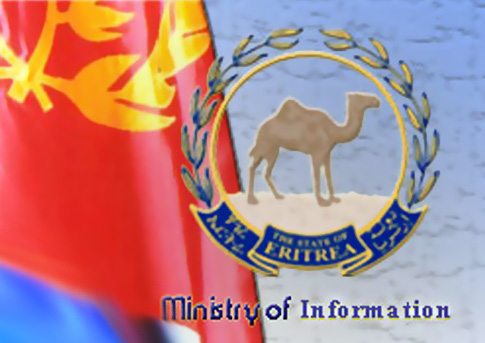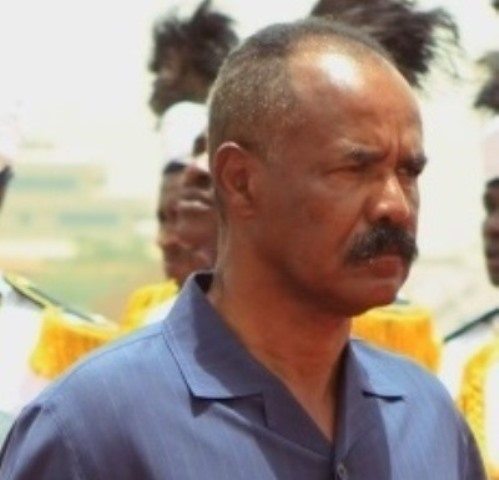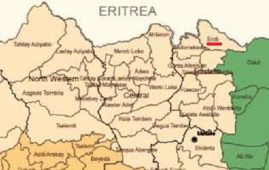Since last week, the Ethiopian opposition in diaspora is entertaining a renewed hope that a North African and Mideast styled revolt may take place in Ethiopia.
It was caused by a news that an Ethiopian man, Yenesew Gebre, set himself on fire in political protest. Yenesew Gebre, 35, was resident of Southern Nations, Nationalities and Peoples Regions(SNNPR), Dawro Zone, Tercha town.
The news first came from the Ethiopian Satellite TV (ESAT). ESAT is a broadcaster based in Netherlands and supported by the outlawed party Berhanu Nega’s part Ginbot 7, according to the 2010 State Department Human Rights report.
Citing ESAT, a US-based Ethiopia site claimed last week, on Tuesday, that:
Yenesew Gebre made an impassioned plea at a protest gathering before dowsing himself in petrol and setting himself on fire.
Addressing fellow protestors he is reported to have said: ’I want to show to all that death is preferable than a life without justice and liberty and I call upon my fellow compatriots to fear nothing and rise up to wrench their freedom and rights from the hands of the local and national tyrants.’
It is understood that Gebre died from his injuries three days later at the Tercha city local hospital.According to sources who spoke to the satellite TV station, ESAT, Yenesew had been campaigning against injustice at the hands of ruling party officials. It also appears that he had been fired from his teaching position because of his political views.
After a spate of protest rallies and a lengthy dispute between government representatives and the local community, senior government officials called public meeting on Friday November 11, at the Tercha city administration building for the southern region of the country.
It was during the meeting that Yenesew Gebre reportedly stood up and spoke out against Meles Zenawi’s regime. When security agents tried to stop him and throw him out, Yeneneh walked out of the meeting hall and poured benzene on himself and set himself alight infront of the other protesters gathered in the compound.
‘While fire was engulfing his whole body, he was calling for justice, freedom and democracy and urged people to rise up against the oppressors. He wanted martyrdom … he chose to sacrifice his life for the sake of liberty and justice,’ a local source who witnessed the shocking incident told ESAT.
According to close friends, Yenesew Gebre was widely respected and well known for raising serious issues and challenging authorities.
In a bid to quash any further protests in the area, the federal police and the security services have reportedly sealed off the town. The regime has cut telephone lines to prevent the news of Yenesew’s death from spreading across Ethiopia, according to ESAT.
Two days later, however, the quasi-official media, Walta Information Center (WIC) reported the incident as a simple act of suicide by a mentally unstable person. came up with another story. The news was backed by a copy of the medical report the postmortem examination. WIC reported on Nov. 17 that:
Medical record, his families and local communities confirmed Yenesew Gebre, who burned himself to death in Tercha town in Dawro Zone, to have mental illness.
Sources told WIC that his death has no relation with maladministration and injustice as some media propagate; especially VOA Amharic program and ESAT.
His families, General Manager of Tercha Hospital, Dawro Zone Police Commander and Chief Administrator of the Zone confirmed the information being disseminated by some overseas media about Yenesew’s death as fake and groundless.
General Manager of Tercha Hospital, Mebratu Masebo, said that Yenesew had severe mental illness and he had been attending various treatments at the hospital when he was alive.
His medical record at the hospital indicates that he had attended mental treatment at various times and passed away on Monday at the hospital.
Tadelech Bekele, resident of Tercha town and the victim’s elder sister, said Yenesew had served as a teacher in Silte Zone for some time after graduating from Hawassa Teachers College. Due to his mental problem, he quit his job and returned to Tercha town, where he attended medical care at the hospital.
Following improvement in his health condition, he began working as a teacher in Tercha Vocational and Technical School. But after seven months of service, he stopped his work as his health condition began to deteriorate, she said.
“My brother always asked me to give him money for Khat (narcotic plant), cigarette and drinks. After drinking, he always disturbs residents of the area including me and may families. In 2001 E.C, I informed to police my brother to be detained. After that he disappeared from the area for two years,” she said.
“He returned to Tercha early September this year. Beginning from late October, his health continued to deteriorate and he began disturbing my family. He lit himself on fire last week as I was preparing to apply to police for his detention,” she said.
She further expressed her anger over the wrong information disseminated by VOA Amharic service and ESAT about the death of her brother, which according to her utilized him for their hidden political agenda.
According to Tadelech, her brother was buried in accordance with Christian tradition in the presence of his families and friends. The report by VOA and ESAT about his burial ceremony was baseless and it is a shame for these media to mislead the public, she said.
Representative of Dawro Zone Police Commander, Deputy Commander Bako Tina, on his part said that Yenesew is known to have mental illness.
He confirmed being contacted by the victim’s sister for Yenesew’s detention three years ago. He denied earlier media reports surrounding the circumstances of Yenesew’s death and his burial ceremony.
According to Bako, his body was buried in Kale Hiwot Church in the presence of his families and friends.
Chief Administrator of Dawro Zone, Israel Atara, on his part said the report by VOA and ESAT about Yenesew’s death is unfair and called it total fabrications.
Yenesew had no participation in the local community’s request to shift the zonal town from Tercha to Waka, he said.
“The false propaganda being disseminated to incite violence and terror in Ethiopia by these groups, labeled as terrorist organizations, will have no place among Ethiopians,” said the chief administrator.
The administrator and family of the victim urged overseas media, especially ESAT and VOA, to restrain from inciting violence in Ethiopia by propagating unfounded and wrong information.
Their attempt to link Yenesew’s death with Tunisia’s Mohamed Bouazizi clearly indicates their feeling of hopelessness. Ethiopia has already passed the kind of civil war which recently occurred in most Arab countries some 20 years ago.
The fast economic growth Ethiopia is registering amid the current global economic downturn, testifies the government’s commitment for development.
It is to be recalled that the Tunisian Mohamed Bouazizi, an unemployed college graduate with children to feed, had set himself on fire on Dec. 17 when the police confiscated his cart and denying him the opportunity to earn living by selling vegetables. Bouazizi expressed his frustration by dousing himself in gasoline and setting himself ablaze. The incident triggered weeks long revolt that led to the forced resignation of Tunisian President in January 14.
Boazi’s act was imitated by more than a dozen men in Algeria, Saudi Arabia and Egypt. However, as self-immolation is neither a necessary nor a sufficient condition for revolt, despite some 20 Algerians set themselves on fire since January, the country has not experienced a fraction of the Tunisian and Egyptian uprisings.
The bottom line is: whether our country man, Yenesew Gebre, committed a simple suicide or wished to make a political statement, his act per se couldn’t be taken as an indicator of things to come.
[Image below: Death Report of Yenesew Gebre (Credit: Waltainfo.com)]
Note on Self-immolation:
Self-immolation refers to setting oneself on fire, often as a form of protest or for the purposes of martyrdom or suicide. A Wikipedia entry on the term Self-immolation indicates that:
The word "immolate" is used in the English language when denoting consumption by fire, whether autonomously or imposed. The Latin-based English word immolate, which for centuries was rarely used, means sacrifice ones self, without any reference to burning, so more generally self-immolation means suicide without specifying the method. The word itself comes from the Latin "immolare", to sprinkle with meal, in reference to the ritual sprinkling of the heads of sacrificial victims with wine and fragments of mola salsa.
It was Western media coverage of Buddhist monks immolating themselves in protest of the South Vietnamese regime in 1963 that introduced the word "self-immolation" to a wide English-speaking audience and gave it a strong association with fire.
According to an article, titled ‘A Brief History of Self-Immolation’:
Legends of people of committing the act of self-immolation date back centuries. The first instance is said to come from Sati, one of the wives of the Hindu god Shiva. According to myths, she married against her father’s wishes and then burned herself to death after her father insulted her husband. This story is often linked to the practice of sati, which was a custom in some parts of India where a widow would burn herself on the funeral pyre of her dead husband. The practice was outlawed in India in 1829. History through the ages in various parts of the world is lined with tales of female spouses, consorts and concubines being consigned to the flames, often against their will, to join some deceased warrior king or chieftain.
The first and most famous moment of self-immolation as agitprop was that of Thich Quang Duc in 1963. Under the rule of Ngo Dinh Diem, South Vietnam largely advanced the agenda of the country’s Catholic minority and discriminated against Buddhist monks. In one of the most dramatic instances of individual protest, Quang Duc doused himself in gasoline in the middle of a Saigon street and lit himself ablaze.
*****************







HEy hey that’s pretty amazing article, well done, well i am in between of writing an ebook which will go for sale on amazon, i was wondering if i could use article with proper credits ofcourse, only if you allow
Ethiopia needs real heroes and herons that oppose with factual evidence.we don’t need selfish opposition leaders who always eager to fight for the chair and not for the people